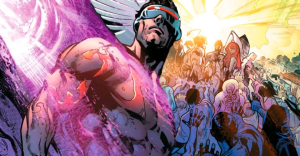Buffy The Vampire Slayer: Why “Earshot” Was Pulled By The Network

Joss Whedon’s cult classic television show, Buffy the Vampire Slayer, resonated heavily with fans for exploring poignant social issues, but one episode in season 3, “Earshot” was pulled from airing on The WB for a very specific reason.
Though Buffy the Vampire Slayer is certainly a teen and young adult-oriented supernatural drama, it also functions as a coming of age tale, especially in earlier seasons when the Scooby Gang were still in high school. From season 1 to season 3, Buffy Summers (Sarah Michelle Gellar) and her friends try to balance various supernatural threats – as their high school in fictional Sunnydale, California is conveniently located on the Hellmouth – with real-life, relatable issues that teenagers experience. Season 3 saw the gang as high school seniors, dealing with prom, graduation, the question of which college they would attend, career goals, and the like.
Season 3, episode 18, “Earshot”, explored another element of the high school experience: isolation, loneliness, and how these feelings can cause people to make very grave decisions. After Buffy gets the ability to hear everyone’s thoughts, she discovers several unexpected downsides to her new “gift”, including overhearing a threat while in the crowded school cafeteria: “this time tomorrow, I’ll kill you all.” At the time of season 3’s run on television, 1999-1999, school shootings weren’t as commonly talked about or as prevalent in media as they are in 2020. Not only was the situation shocking for audiences at the time, but the episode’s air date was pushed back to September 21, 1999. It was initially set to air just a week after a major tragedy which was, at the time, entirely unprecedented.
Why “Earshot” Was Banned From Airing On The WB

On April 20, 1999, a mass shooting occurred in Littleton, Colorado at Columbine High School. Two students, Eric Harris and Dylan Klebold, murdered 12 students and 1 teacher, then committed suicide; Harris and Klebold were both seniors at Columbine. After the shootings, the media condemned the consumption of violent media amongst young people, particularly movies within the horror genre. While Buffy the Vampire Slayer is horror-adjacent, it was more palatable for young audiences than feature films within the horror genre, such as 2000’s Ginger Snaps, which was harshly scrutinized at the same time for the same reasons and almost didn’t get made because of it.
In “Earshot”, Buffy’s gift allows her to not only figure out one person who is intending to commit a terrible act, Jonathan Levinson (Danny Strong), but talk him down from his attempt. Jonathan was attempting to commit suicide with a gun he brought to school. This is a powerful moment not only for Buffy and Jonathan, but for the show, as it puts a narrative in place that often the people who intend to be violent and harm themselves or others are in a lot of pain and just need someone to make them feel heard. While this isn’t always the reasoning behind mass shootings or other similar crimes, it shines a light on the loneliness that many high school students and teenagers experience; they feel alone in the world, with no other options, and make bad choices in order to cope or right the wrongs they feel they have suffered.
“Earshot” pitted Buffy against a different kind of foe, and while she temporarily saved Jonathan, he ended up becoming a major element later on in the show as part of a three man group of villains known as “The Trio”. Warren (Adam Busch), the group’s leader, was arguably the most sinister of the three, and went on to shoot Buffy and murder Tara (Amber Benson) in season 6, episode 19, “Seeing Red”; this event was one of the show’s most random acts of violence. “Earshot” finally aired on The WB two months after the season 3 finale of Buffy the Vampire Slayer, “Graduation Day, Part Two”.
About The Author


















